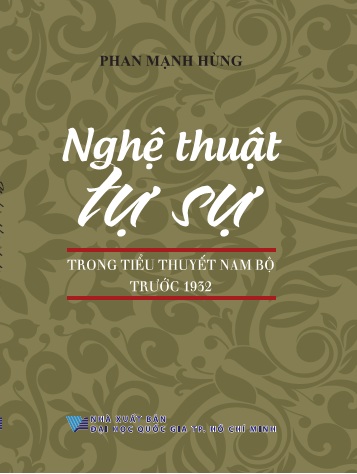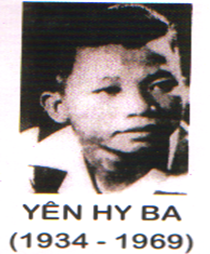DISSERTATION INFORMATION
Title: Sino literature on Buddhist theme by Confucian authors of the Le - Nguyen Dynasty: Appearance and Achievements
Major: Vietnamese Literature
Code: 9220121
Candidate’s name: Lê Sỹ Đồng
Supervisor: Assoc. Pro. Dr. Nguyễn Công Lý
Name of Institute: University of Social Sciences and Humanities, Vietnam National University Ho Chi Minh City.
Abstract
With the research object of the thesis being the appearance, content, and art of Sino literature on the topic of Buddhism by Confucian scholars in the Le - Nguyen dynasties, the thesis will simultaneously apply the different research methods at each level: Group of specialized methods: Historical literary, Poetics, Typology, and Textology; Group of interdisciplinary methods: Religious studies, Philosophy, and Cultural studies; Group of complementary methods: Collection, classification, statistics, analysis, comparison, synthesis.
The thesis will study the basic contents of the social context of the Le - Nguyen dynasties to clarify the factors affecting the content and ideas in literary works. From there, the thesis will survey and generalize the appearance of the author, genre, and topic of Buddhism while clarifying the values of content and art of this genre.
On that base, the author aims to address the core goals of the dissertation:
Chapter 1: General introduction of the practical and theoretical bases related to the thesis including: an overview of works collecting and translating Sino literature about Buddhism; a summary of research works on the history or period of literature written about Buddhism; an overview of research works on Buddhist literature in particular, and literature in general with content, ideas, and art related to Buddhism.
Chapter 2: Statistics of all authors in the five centuries from the 15th century to the end of the 19th century (Le - Nguyen dynasty) writing Sino poetry and literature about Buddhism; statistics of genres, and the number of works in each genre; along with the main topics in poetry and prose written about Buddhism in this period.
Chapter 3: Analysis of basic expressions of content value such as the attitude of receiving Buddhist language, expressing the author's contemplation on the situation - scene - view from the Buddhist worldview or the concept of Confucian scholars in the harmonious relationship between Confucianism and Buddhism; and finally reflects the sacralization and desacralization of Buddhism.
Chapter 4: Evaluate the contributions of this genre in terms of form genre, language, and expression in the process of Vietnamese medieval literature.
The results of dissertation
Research related to the topic has not yet had specialized research works on the subject of our thesis. Therefore, the research results of the thesis have contributed to a deeper and more specific understanding of the Sino poetry of Confucian scholars writing on the topic of Buddhism.
In terms of the number of authors, there are all status: kings, lords, and Confucian scholars (not to mention the Confucian scholars who are anonymous authors writing epitaphs). Besides the differentiation in the number and class of authors, the differentiation in the number of authors associated with the genre of writing is also a highlight of the appearance of the authors in this period.
When writing about Buddhism, Confucian scholars have a rather objective and proactive attitude. Specifically, when receiving the form of language as well as the content of Buddhism, they often look for profound meanings that Buddhism helps the people and the country with the goodness in adjusting moral behavior, and forming human personality according to the common standards of the time.
Regarding the concept of Confucian scholars towards Buddhism: Confucianists not only stopped at admiring Buddha, supporting the inclusion of Buddhism into Confucianism, but also interpreted Buddhist scriptures based on Confucian knowledge, along with a rather harmonious way of behaving as a synthesis of Confucianism and Buddhism. In addition, the attitude of Confucianists towards Buddhism was also divided into two trends: sacralizing or desacralizing Buddhism.
In terms of artistic value, we see that the greatest contribution of Sino poetry and literature written on the subject of Buddhism during this period was to reflect the influence of the Buddhist spirit on artistic creation. In the poems, we see that the language is associated with honesty and simplicity, which is extremely natural. In the essays and epitaphs inscriptions, we see the flexibility and liberal spirit of Buddhism. In the interpenetration and adaptation of Buddhist literature, poetry is the application of verse genres mixed with ancient and modern poetic forms. Along with that, the story non-fiction and fiction genres also reflect Buddhist elements as well as the genre mixing in the works. One special thing is that in Sino works written on the subject of Buddhism, the authors have used many words, allusions, and images derived from Buddhist culture.
Practical applications/ capabilities or outstanding problems needs to continue researching
Practical applications/ capabilities
By surveying five centuries of literature (from the 15th century to the end of the 19th century) on Sino poetry written on the Buddhist theme by Confucian scholars, along with interdisciplinary and specialized approaches to evaluate and classify the types of authors, genres, and creative themes; exploring the values of content and art of Buddhist themes in the Le - Nguyen dynasties with unique features such as attitudes, thoughts, and concepts of Confucian scholars; as well as the creativity of Confucian scholars in artistic forms, the research results of the thesis can be used as reference materials in the research, study, and teaching of Buddhist Literature.
Open research issues:
Within the scope of the study, the thesis still leaves open the comparison of the literary process of writing about Vietnamese Buddhism with that of other countries in the region such as China, Japan, or Korea.
In addition, the thesis also suggests further research topics such as: Comparing Sino poetry and literature of Confucian scholars with Sino poetry and literature of Zen masters; Comparing religious theories with secular theories in the Middle Ages; Comparing folk Buddhism in memoirs with Nom poetry and stories, etc.
In short, Sino poetry and literature written about Buddhism by Confucian scholars in the Le - Nguyen Dynasties has contributed to a clearer understanding of the creative team, attitudes, thoughts, and spirit of Confucian scholars towards Buddhism, as well as the contemporary social situation. At the same time, this field of writing also brings a new look to the art of expression in Vietnamese poetry and prose in the Middle Ages.
| Confirmation by Academic Supervisor |
PhD. Candidate |
|
Assoc Pro. Dr. Nguyễn Công Lý
|
Lê Sỹ Đồng
|


